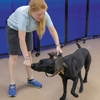Understanding DCM in Dobermans (and other breeds): What Every Owner Should Know

Dilated Cardiomyopathy (DCM) is one of the most serious health threats facing Dobermans. It’s a stealthy, often fatal condition—but one that responsible owners can help manage or even delay through early screening, smart puppy selection, and nutritional support.
What Is DCM?
DCM is a disease where the heart becomes enlarged and weakened, losing its ability to pump blood effectively. Over time, this leads to heart failure, arrhythmias—and, sadly, in many cases, sudden death

Dobermans are especially vulnerable:
➡️ Up to 58% develop DCM in their lifetime.
➡️ Risk increases steeply after the age 6.

Common Symptoms of DCM
While some dogs collapse suddenly, others show warning signs:
- Fainting or weakness
- Coughing or laboured breathing
- Reduced stamina on walks
- Swollen belly (due to fluid build-up)
- Irregular heartbeats (arrhythmias)
How to Screen for DCM
Start annual checks at age 2, using:
- Echocardiogram – to assess heart structure and size
- 24-hour Holter Monitor (ECG) – detects electrical abnormalities
- Bloodwork – NT-proBNP and troponin I indicate cardiac stress
- Genetic Testing screening for DCM1, DCM2, DCM3, or DCM4 markers may be advisable. It is well accepted now that the high incidence of DCM (dilated cardiomyopathy) in Doberman Pinschers is at least partially the result of genetics. Genetic markers have been identified which can be linked to DCM though it must be stressed that the presence of these markers does not indicate with any certainty whether a dog will develop DCM or not. In plain English - the markers can be present, but no DCM develops or alternatively there are no markers, but DCM does develop.
These markers are imaginatively called DCM1, DCM2, DCM3 and DCM4.
The Doberman breed of dog has evolved a little differently around the world with distinct populations in the USA and Europe showing differing traits. These are not confined to physical differences - as there also is a contrast in genetic disposition to the heart disease DCM between European and US dogs.
Originally US research led to an association being discovered between genetic markers DCM1 and DCM2 with a predisposition to cause or in some way be involved in the onset of DCM.
There are other genetic markers now identified, namely DCM3 and DCM4, and these markers have led to a particular association with DCM in the European population of Dobermans. Whereas the same research rather precluded DCM1 and DCM2 being an adverse factor in Europe.
Therefore, although it is still wise to test Dobermans for these risk factor markers, an owner should take account of the advised tests from their local genetic testing facility, who will have the relevant experience to select markers appropriate for the local population of Doberman.
Our July "Health Bulletin" focused on DCM in Dobermans and other breeds. Upon publication we were contacted by Sue Thorn, UK Kennel Club Breed Health Coordinator for Dobermanns. Sue made some observations that we think would improve understanding for UK owners; since DCM1 and DCM2 markers have not been shown to be linked to DCM in UK dogs, then their presence is not a risk factor for DCM in the UK.
In summary we advise owners of Dobermans that it may be useful to know whether your dog has the appropriate DCM markers in its genetic makeup but be aware, that though this indicates that the dog is at higher risk, it does not indicate that DCM will in fact develop.
Choosing a Puppy: What to Ask Breeders
✔️ Are both parents genetically tested, review the results guided by your region and Kennel Club's guidance
✔️ Have they had a Holter and echo within the last 12 months?
✔️ Is there data showing a longevity in the bloodline?
✔️ Is the breeder part of a club that follows cardiac screening guidelines
The best breeders are transparent, testing both parents and following cardiologist-approved protocols. It’s your dog's heart—you have a right to ask.

Supplements That May Help
L-carnitine and taurine high strength is involved in heart muscle function. Some dogs benefit from supplementation, particularly:
- Dobermans, Boxers
- Cocker Spaniels (often taurine-deficient)
- Newfoundlands, Great Danes and Saint Bernards
Other helpful additions:
- Omega-3 fatty acids
- Carnicare (from Ace Canine)—a supplement formulated for canine heart health
Supplements won’t cure DCM, but they may support the heart’s metabolism and slow progression in some cases—especially alongside prescribed medications.
Other Breeds Affected by DCM
While Dobermans are most at risk, DCM also affects:
- Great Danes, Irish Wolfhounds, Newfoundlands, Saint Bernards
- Boxers, Cocker Spaniels, Afghan Hounds, Portuguese Water Dogs
- Some Labradors, Goldens retrievers and Weimaraners (especially diet-related cases)
In Boxers, ARVC is often seen—a similar but distinct form of cardiomyopathy. Each breed has its nuances, so breed-specific care is key.
Research & How You Can Help
Universities Actively Studying DCM:
- Liverpool and Edinburgh universities lead interventional clincal and genetic DCM studies.
- University of Florida
- Tufts University
- Report your dog’s diagnosis to these research programs.
- Submit Holter, echo, and blood results
- Contribute DNA or participate in ongoing studies (some offer free testing)
- Owners and breeders can support UK science by participating in clinical screening programs, tissue donation upon passing, and contacting these universities for collaboration.

Q&A: Your Top DCM Questions Answered
Q: Should I screen my young Doberman even if they seem healthy?
A: Yes! DCM often progresses silently. Start annual Holter and echo checks at age 2, or earlier if there's a family history.
Q: Is grain-free food linked to DCM?
A: Possibly. Some diet-associated cases have been tied to legume-heavy or grain-free diets. Speak to your vet before switching foods and establish a suitable diet.
Q: What’s the difference between DCM1, DCM2, DCM3 and DCM4?
A: They refer to genetic mutations (PDK4 and TTN) in different sub-populations of Doberman. A dog can test positive for one, both, or neither—but still develop DCM, so regular monitoring remains essential. Also, dogs without any of these markers can still develop DCM.
Q: Can supplements like CarniCare replace heart meds?
A: No—they’re supportive, not replacements. Always use under veterinary guidance, and alongside prescribed treatments.
Q: Can I prevent DCM altogether?
A: Not always. But smart breeding choices, early detection, and supportive nutrition can delay onset and improve quality of life.

Final Takeaways
✔️ DCM affects over half of Dobermans, often silently
✔️ Start screening from age 2—Holter + echo are essential
✔️ Ask breeders for genetic clearances and recent cardiac testing
✔️ Support heart health with targeted supplements and a vet-approved diet
✔️ Report cases to research programs to aid future prevention
Final Word
DCM can be devastating—but with knowledge, action, and the right veterinary support, you can make a real difference. Early checks, thoughtful nutrition, and informed breeding all contribute to life expectancy.
🔗 Explore Carnicare for Dobermans and other DCM focused breeds from Ace Canine Healthcare.
Further Reading
There are some technical articles in on our website that may help you to understand more; https://acecanine.myshopify.com/pages/dog-health-articles-dilated-cardiomyopathy-dcm
https://acecanine.myshopify.com/pages/dog-health-articles-heart-murmurs
Call or email us with questions 0118 9842871 or support@ace-canine.com

-
Posted in
Amino Acids Taurine and L-Carnitine, Competition dogs, Doberman Pinschers, Dog body language, Dog health, Dog heart Failure, Dog Heart Failure Supplements, Dog Immune diseases, Dogs CHF, Dogs Congestive Heart Failure, Dogs DCM, Dogs Dilated Cardiomyopathy, Dogs L-Carnitine supplement Heart Failure, Dogs Mitral Valve Disease, Dogs Taurine Supplement in Heart Failure, Owners Stories, Taurine for Dogs, The No1 dog joint care supplement










